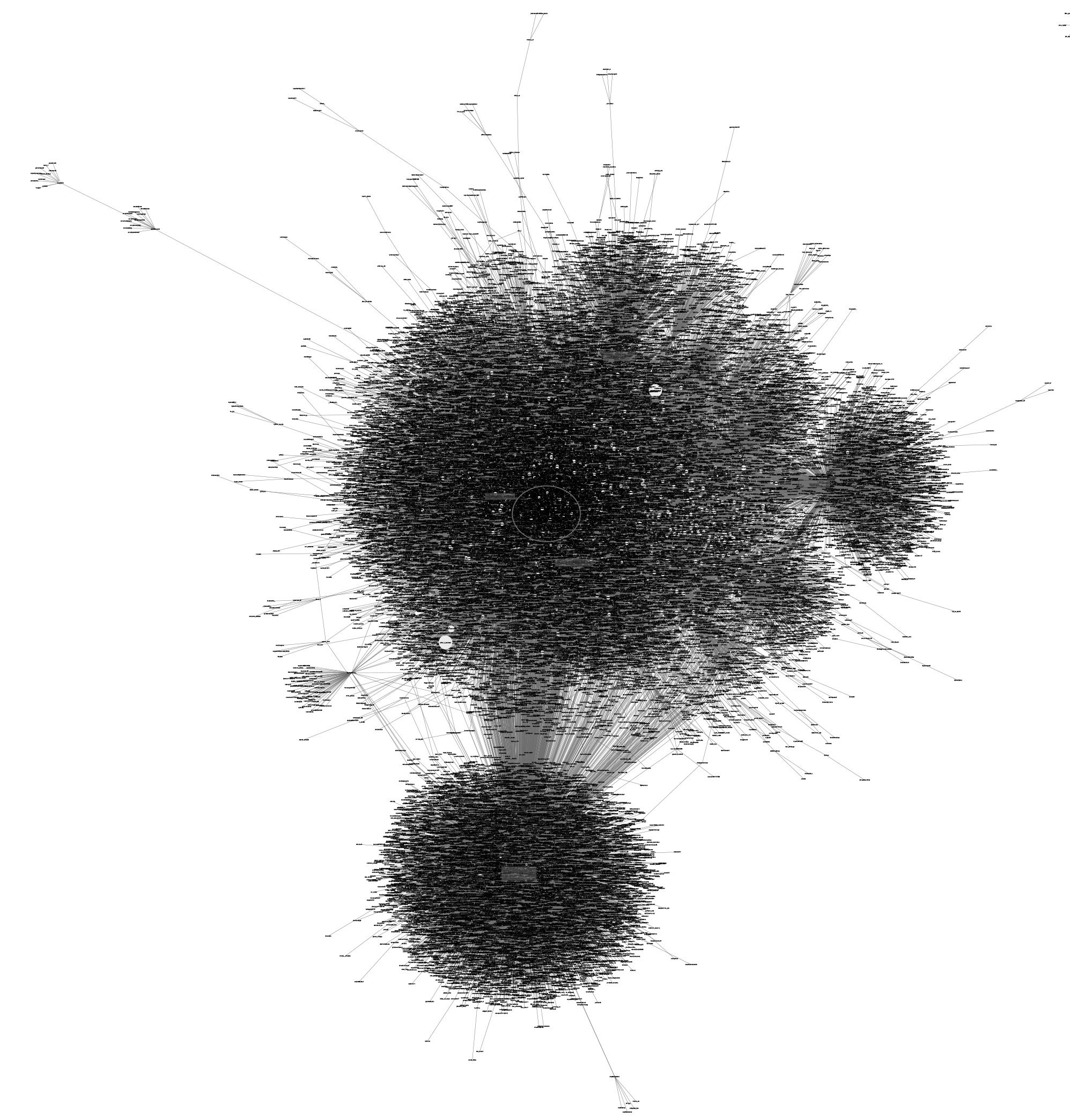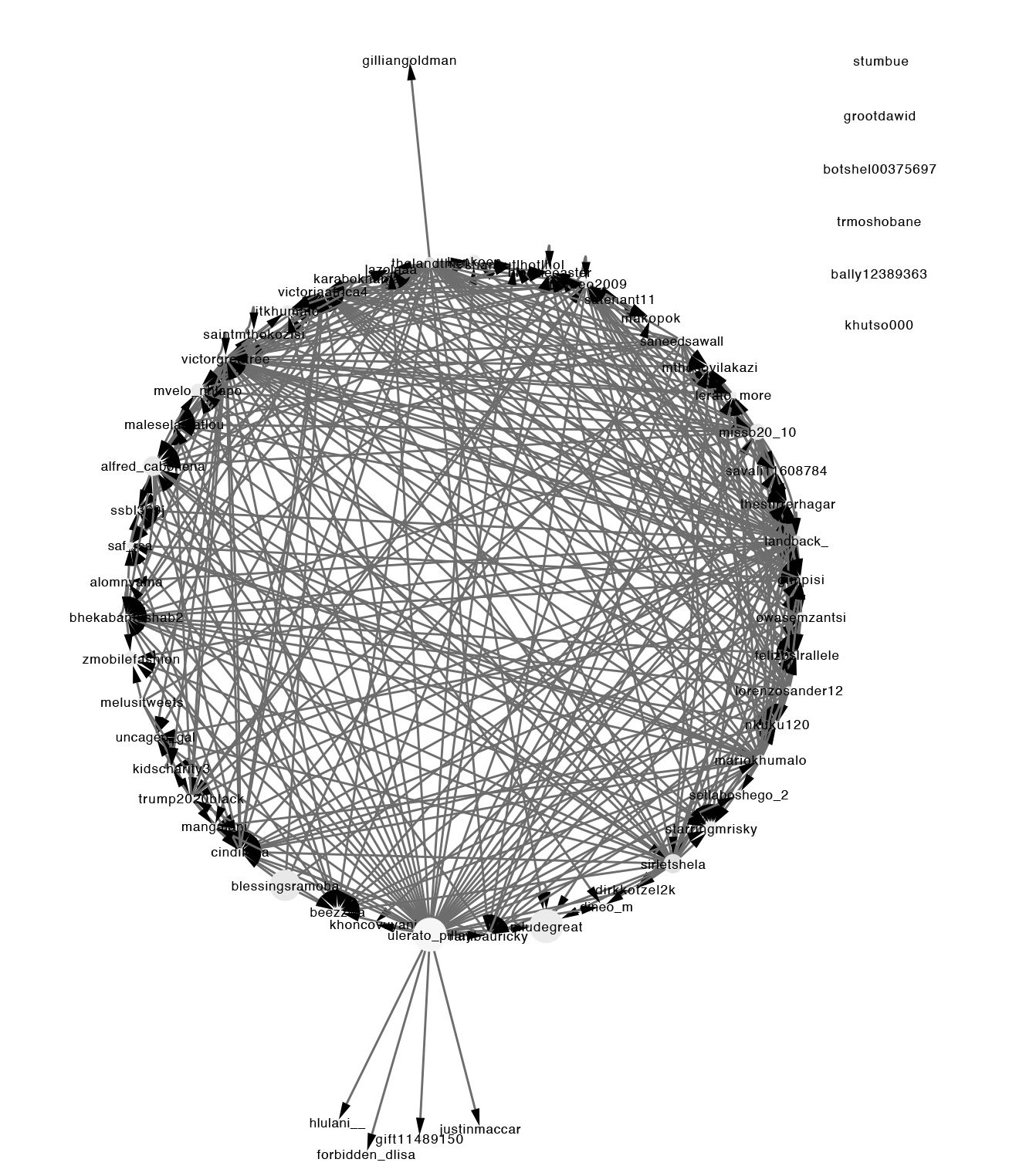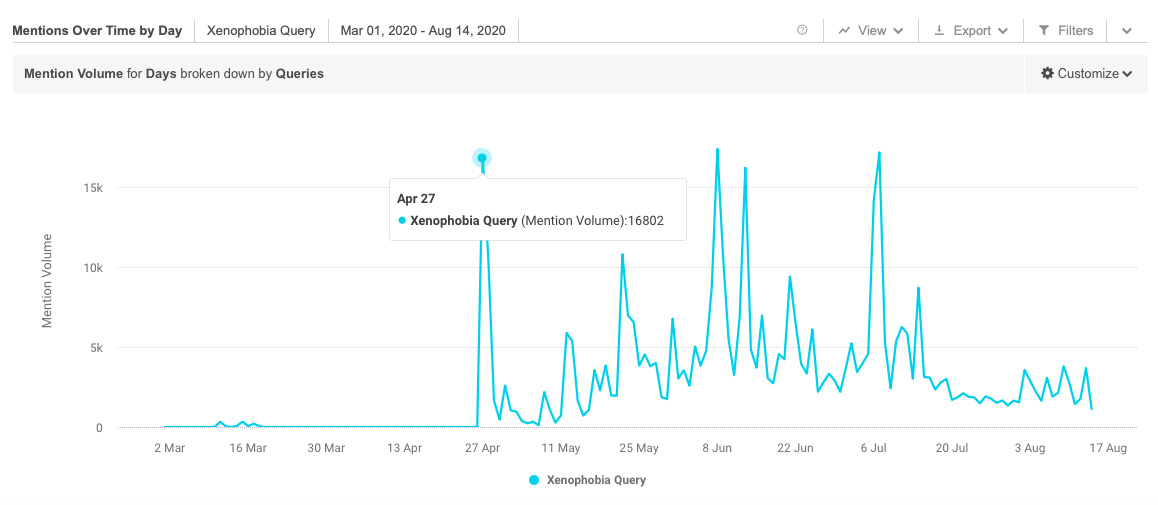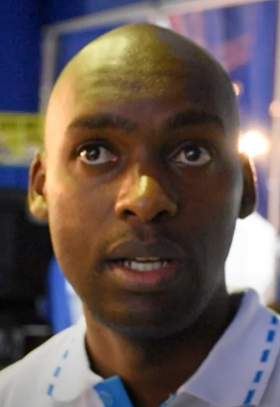SCORPIO
@uLerato_pillay: How the xenophobic network around #PutSouthAfricaFirst was born and then metastasised

South Africans on Twitter are witnessing the rise of an influential anti-immigrant lobby and thousands, captured by a make-believe character, ‘Lerato Pillay’, have unwittingly become complicit in the explosion of a weaponised conversation. Now, an analysis of the social media conversation by the Centre for Analytics and Behavioural Change has deemed uLerato to be part of a ‘dangerously orchestrated narrative’ that has affected at least 50,000 accounts so far.
An anonymous Twitter account, framed as an avatar of the disenchanted South African, has been skilfully corralling all that anger, betrayal and helplessness over corruption, unemployment and crime into one single campaign driven by the hashtag, #PutSouthAfricaFirst.
What is, at first glance, an innocent hashtag, has been repurposed to weaponise South African outrage. And, that anger is being directed at African immigrants.
The Centre for Analytics and Behavioural Change (CABC) conducted a deep dive of the conversation around the hashtag on Twitter and found evidence of a “dangerously orchestrated narrative”.
“There are certainly patriotic or nationalistic South Africans who are innocently roped into the conversation. Many are unaware of the more sinister motives of the network,” says Stef Snel, director of the Dialogue Facilitation Team at the CABC.
The conversation is built around a cult of personality, that of a fictional Lerato Pillay who operates as the Twitter user, @uLerato_pillay.
This account has amassed a sizeable army that likes, shares and retweets material, much of which serves to amplify one primary message:
- That African immigrants in Mzansi must be sent packing;
- That they’re depriving South Africans of jobs;
- That they are burdening the country’s public health system and,
- That they are responsible for crimes, and even infrastructure damage.
Having coalesced around uLerato on their myriad angers — be that anti-ANC or anti-EFF sentiments, gripes about corruption or crime or even political ambition– thousands of South Africans have unwittingly become the foot soldiers as they feed the beast with “case studies” of misbehaving immigrants from Limpopo to Kempton Park.

uLerato_pillay is but one of roughly eight aliases on Twitter, but this account has been deemed the main one in view of its size.
Daily Maverick recently published a detailed article by a team from Digital Forensics Research Lab, which began to examine the true identity of uLerato_pillay.
Now, the CABC has probed the conversation involving the uLerato account and the #PutSouthAfricaFirst hashtag and reached alarming conclusions.

This is a map of the full conversation taking place around the #PutSouthAfricaFirst hashtag on Twitter. In the centre of the larger cluster sits uLerato’s loudhailer, around 80 suspicious accounts that furiously tweet and retweet material.
They found evidence that the account sits at the centre of a well-oiled propaganda machine that is sophisticated and co-ordinated while circumstantial evidence also suggests it could be funded to the tune of around R1-million a month. In addition:
- The main uLerato_pillay account, created in November 2019, is the primary driver of the anti-immigrant campaign. The account seems to be managed by a real person because it generates its own content. And, although there are roughly eight alias Leratos in the network (new ones crop up almost daily), the main one is so prolific that it is unlikely that just one person is managing it.
- This account is backed by a web of roughly 80 interconnected Twitter accounts that serve as her main channel into the Twittersphere, essentially an echo chamber. The CABC team linked them, in part, due to the frequency at which they interact with each other, recycle one another’s tweets and the fact that they display the same engagement methods as well as a sense of familiarity.

This is uLerato’s echo chamber, the most important cluster of Twitter accounts as they were found to be highly connected to one another based on the frequency of their interactions.
- There is a clear hierarchy and structure by size and leadership roles in the xenophobia conversation with uLerato up top. In almost evangelical fashion, uLerato announces which hashtag is to be used on a particular day and commands the army of willing and unwitting handles to execute.
Along with the main uLerato account, the CABC flagged @SirLetshela and @UmalambaneZN, an account boasting more than 185,000 followers, as being among the network’s influential Twitter accounts.
- Virtually all the network’s messages fall just short of incitement or what would formally be categorised as hate speech. This shows they are familiar with the Twitter boundaries and know how to exploit them.
While the CABC says it has no evidence of financial exchanges in the network because this is beyond its ability and mandate, its research provided very strong circumstantial evidence that this is a paid network.
Said Snel: “By simply analysing how recently the accounts were set up or reactivated, their low number of followers and that they retweet the same material — or similar versions of the same material — it is clear that the network is co-ordinated.”
The CABC did not want to undermine the right to freedom of speech of those involved in the uLerato account. But, Nel said, it objected to the manner in which innocent people were being corralled into supporting the network.
“It is deceptive, dangerous and fundamentally undemocratic.”
Even a cursory look at the type of tweets that are posted by uLerato Pillay indicates a clear dislike for foreigners and celebrates when they are barred from owning spaza shops, Snel said.
“Our intention is to make South Africans aware of this type of manipulation that seeks to undermine social cohesion and promote dissent.”
Those pulling uLerato_pillay’s strings have masterfully expanded the account’s reach by piggybacking on other influential Twitter accounts, including that of EFF leader, Julius Malema, whose party is vocally anti-xenophobic. The CABC found that Malema, with his more than three million, was not an active participant in the network’s xenophobic conversation but rather, that accounts in the network were constantly tweeting @Julius_S_Malema. This was no doubt done to capitalise on his vast reach on the social media network.
This is a network that is sophisticated and tech-savvy. Accounts in the organised arm thereof take on the appearance of real people who have a genuine interest in a conversation. They take content from ordinary people and feed it back into the network, thereby creating a false impression that they are real and engaged participants in the conversation.
“They don’t just manufacture outrage. They weaponise it,” one of the analysts said.

Tweets like these form part of the network’s signature.
Hashtag under a microscope
The CABC’s team had used #PutSouthAfricaFirst as a proxy for the investigation given how prevalent the hashtag had become in this conversation. They zoomed in on activities for a few weeks between 1 April 2020 and 31 May 2020, a period that was marked by a spike in the xenophobia conversation — coincidentally taking off just as South Africa slipped into the Covid-19 lockdown slumber.
After collating the network’s patterns into a data set, they were able to conclude that there was no meaningful conversation around #PutSouthAfricaFirst until 27 April 2020. On this day alone, there was a sudden surge of more than 16,000 mentions of the hashtag — many of those were generated by accounts in the cluster that can be regarded as uLerato’s inner circle, the research found.

This CABC’s graph illustrates a massive jump of the #PutSouthAfricaFirst hashtag on 27 April 2020.
And, there was a rapid escalation of mentions of the hashtag in the conversation from 1 March to around June/July 2020 when it rose from roughly 100 mentions to 15,000 mentions a day. This again points to the workings of a co-ordinated and orchestrated effort.
Boosted by paid Twitter?
The CABC team used software, including Brandwatch and PageRank, to and pulled together a map of the interaction between thousands of accounts in the xenophobia conversation. This allowed them to establish patterns of behaviour, connections between different accounts and, to identify the most important Twitter accounts in the network.
They were able to isolate uLerato’s mainframe of around 80 accounts among which they found a batch group suspected of being paid to boost uLerato’s content.
Among those, they found accounts like @KaraKhama, @LorenzoSander12 and ImmigrantsGo that were created between January and May 2020 and which all displayed an obvious similarity in tone and online behaviour as some of the big influential accounts in the network.
A third layer of accounts like @Zmobilefashion, @landback and @VictorGreattree all showed signs of having been bought as they not only lack personality, they almost exclusively tweet and retweet xenophobic material in a one-dimensional fashion. Created years ago, these accounts were found to have been dormant for a long time before they were resuscitated between November 2019 and March 2020. These dates, the CABC highlighted, are massively significant in the overall timeline of this network as they coincide with the proverbial birth of @uLerato_pillay on Twitter in November 2019 and the weeks leading up to the April 2020 spike in the xenophobia conversation.
Professor Loren Landau of the African Centre for Migration and Society at Wits University, asked by Daily Maverick to scan and informally assess the main uLerato account, summed it up like this:
“The feed seems to be a sophisticated web of influencing akin to the Russian efforts to seed distrust in Hillary Clinton during the 2016 US election.
“In both cases, the idea is not to overtly lead a campaign, but to plant ideas among susceptible populations/people and let them do the rest. It allows deniability since no single tweet or message is itself overtly inflammatory, but it nonetheless generates doubts, sentiments, and convictions.”
Read more from Professor Landau:
There is no evidence of a foreign hand in this network, which was found to have a distinctly homegrown feel about it.
In just under four months, the campaign has grown and spilled over into a multi-layered network which now comprises in excess of 50,000 accounts with some aspects warranting further investigation.
Whose #hashtag is it anyway?
Several politicians and political parties have become caught up in uLerato’s swirl and the lines are blurred between their respective nationalistic objectives and anti-immigrant sentiments.
- Vuyolwethu Zungulu.
- Mario Khumalo.
- Herman Mashaba.
The network’s favourite hashtag, #PutSouthAfricaFirst (and various derivatives thereof) seem to overlap substantially with the independent, though strikingly similar objective of a trio of newbies on the political scene — The People’s Dialogue of Herman Mashaba, the African Transformation Movement (ATM) headed by Vuyolwethu Zungulu and Mario Khumalo’s South Africa First (SAF).
Their respective leaders all told Daily Maverick they have no ties to uLerato_pillay, don’t know who ‘she’ is and nor do they believe that anything around the #PutSouthAfricaFirst hashtag is xenophobic.
- @uLerato_pillay seems to have a soft spot for SAF, a tiny political party registered in 2016 and which pursues a fiercely nationalistic agenda. The account shares or retweets posts from @SAF and its leader, Mario Khumalo.
Khumalo said: “I have no connection to uLerato. She follows me and I followed her back.”
He said his party, “in solidarity,” would be participating in a (planned) upcoming anti-immigrant march that uLerato is currently broadcasting on Twitter.
Khumalo reckons that #PutSouthAfricaFirst, while being used by all and sundry on Twitter, is a slogan that originated with his party, but maintains that it is purely coincidental that it’s uLerato’s primary slogan too.
ATM president Vuyolwethu Zungula says the party does not have a relationship with uLerato but that, in view of a common agenda, including prioritising South Africans in the local economy, there may be overlaps in its messaging too.
“This fictional character, Lerato, a Sotho name, and Pillay, an Indian name, is an interesting one. She has given ordinary South Africans an opportunity to participate in a conversation without being labelled as xenophobic,” Zungula said.
“We don’t have to like it (the anti-immigrant theme) but we must find a way to engage with this segment of the population,” he said.
And, while it is now trending as a hashtag, Zungula says “Put South Africa First” was incorporated into the ATM manifesto in 2018, long before uLerato arrived on the scene in 2019.
Leader of The People’s Dialogue, Herman Mashaba, seems to echo his political peers on both the anti-immigrant issue and in terms of distancing himself or his party from uLerato.
“We are not associated with uLerato,” said Mashaba, whose organisation is officially launching as a political party on 29 August 2020.
“Why would uLerato arrange a march on August 29 (2020), the very day that we launch our party. My view is she wants to sabotage our launch date.
“But, the idea of putting South Africa or South Africans first is a ‘vital’ part of our campaign.”
Mashaba told Daily Maverick that foreign nationals are not the problem, but rather that the system is, adding that he has been on record, for several years, about illegal immigration and the impact thereof in Johannesburg, where he previously served as DA mayor.
“I got accused of being xenophobic but I have always said I blame Home Affairs (the department of home affairs) for our immigration problems.”
On Saturday evening uLerato posted ‘her’ knock-off tweet:
“Patriotism should not be mistaken for xenophobia, citizens are suffering. The media doesn’t care about the truth anymore.”
Back at mission control the following morning:
“If you see this tweet comment using #OurCountryOurJobs and give your opinion why do you think South African jobs should be for SA citizens.”
Exactly 10 minutes later, ‘she’ was retweeted by one of the alias accounts in the network with further instructions:
“If you see this tweet leave #OurCountryOurJobs in the comment section.”

Profile image (right): Twitter/@uLerato_pillay
A new day, another new hashtag for uLerato’s growing Twitter brigade and scores of South Africans who remain oblivious to being played — or worse — who the puppetmaster is in this act. DM








 Become an Insider
Become an Insider